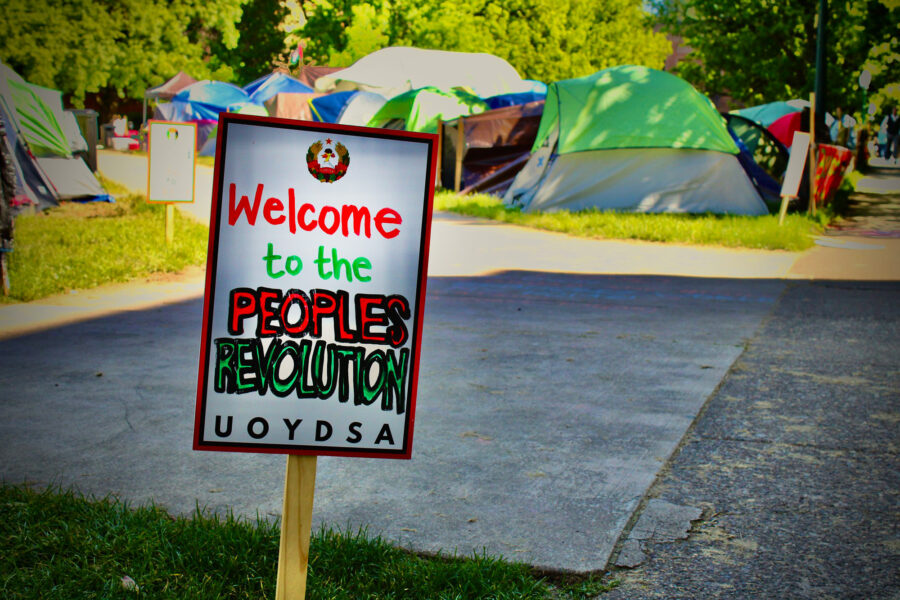What’s Up With Gen Z?
My jaded, heartsick Gen Z compatriots, you should know that you have more power than you realize.
|
Listen To This Story
|
A few weeks ago, over the phone, my dad asked, “What is up with your fucking generation?!”
This question was not rhetorical. The context was his alarm over and disappointment with a lack of political engagement, in the form of voter turnout and polling, demonstrated recently by Gen Z and the youngest millennials — felt especially keenly in the face of a potential MAGA takeover and a crumbling democracy.
His question was also something of an inversion of the familiar oldster-to-youngster plaint, which goes something like “What are you all so hot and bothered about? Give the system a chance — it worked for me and it’ll work for you!” He seemed, at 67, to be asking the opposite: “How can you all be so blasé about it when it’s your future that’s on the line?!”
Of course, I can’t speak for an entire generation of individuals — as diverse as the general population minus the variable of age — but I offered my dad some personal observations (equal parts grievance and self-defense) to begin to explore this issue. If you’re concerned and perplexed, as he is, I hope these observations help shed some light on this “fucking generation.”
And if you’re a twentysomething and relate to any of the feelings and behaviors I describe, please stick around until the end so I can beg for your help in protecting our democracy.
Three Faces of Gen Z
I agree with my dad that Gen Z is malfunctioning as an electorate. Among my peers, I’ve identified a few behavioral trends that help to explain their surprising disengagement. First, though, to give you an idea of whose microscope you’re looking through, you should know a little bit about me.
I’m a 27-year-old white woman scientist at a biotech startup in Boston. Four years ago, I graduated from Smith College, an academically rigorous, historically women’s college with a cultural ethos on the cutting edge of gender, queer, racial, and class activism. I grew up middle-class and currently my personal income is on par with the median household income for the state. My friend and peer groups are reasonably diverse in terms of race, sexual orientation, family immigration history, occupation, and access to wealth.
One way they’re not so diverse is that I can probably count on one hand the number of peers from throughout my schooling and professional years who are openly conservative. So do keep in mind, I’m mainly talking about highly educated liberals in their twenties, residing in coastal blue cities — my neck of the Gen Z woods.

The first camp I’ve identified is what I’ll call the consumer cocooners. These are peers who, troubled as they may be by the events unfolding in our country since (at least) 2020, make enough money to soothe themselves into a sort of apathetic inertia through devoted consumerism.
If you haven’t already noticed, social media and American capitalism have converged such that product marketing is seamlessly interwoven with overt and subliminal messaging about the lifestyles and aesthetics to which we should aspire. Through influencers and direct advertisements occupying an ever-growing digital niche, companies are not just selling products, they’re selling the keys to social capital, comfort, and short-term insulation from the top concerns plaguing our times.
These peers may still be daunted by nearly unattainable upcoming milestones such as buying a home or affording to have children, but at present they have the resources to maintain a quality of life that creates an illusion of safety. Whether or not they’d admit it, there is likely a voice in the back of their head saying, “If it all goes to shit, I’ll still be okay.”
I would not say they are purposely disengaged, but their access to capital allows for the rapid quelling of headline anxiety and has lulled them into self-centered passivity. Of course, there is a spectrum of such cocooning related to one’s intersectional identity and, accordingly, how much one stands to lose were a complete MAGA/Christian nationalist takeover to occur. Broadly, though, this “I’m not in their crosshairs” attitude is fairly prevalent among my peers (and in myself), seeming only to grow stronger with age and income.

Throw Some Bricks, Blow It Up, Burn It Down
In a second camp are those with a burn it all down mentality — call them the arsonists. In contrast to the cocooners, these individuals are typically very engaged in activism — most visibly through social media awareness campaigns, but they also put their money where their mouth is: protesting, donating, volunteering, and pursuing careers in social change.
These are some of the most passionate and driven individuals I know, with warm hearts and strong core values. My concern is that some of them — fed up with the Biden administration’s continued de facto support of Israel’s genocidal acts in Gaza, limited climate policy progress, and/or persistent corporate and political corruption — have decided to abstain or vote third party “on principle” in this year’s election.
Whether they actually believe that a third-party candidate has a shot at winning the presidential election or they think that the conditions in this country need to bottom out in order to instigate a revolution, they’ve lost hope in the current system (it’s hard not to) and envision major social and political reform, preceded perhaps by a period of chaos, but followed by an idealized America rebuilt on peace, equality, and authenticity.
This interpretation is extrapolating a bit based on my exposure to such individuals, but the basic sentiment is backed by recent polling suggesting that a growing cohort of young Americans think that major change and upheaval, whether “positive” or “negative,” is necessary in this country and have concluded that Joe Biden is unlikely to supply that change.

The TikTok Teens (and Post-Teens)
Finally, recognizing that I am at the “old” end of the Gen Z cohort, I’ll make a note on what I’ve observed in younger members of my generation — today’s college students and recent graduates. These are young people who have had most of their adolescence marked by the rise of Trumpism and large swaths of their high school or college years disrupted by the pandemic.
While it’s true that Gen Z has made impressive contributions to activist movements for domestic and international issues (most recently the pro-Palestine campus protests), many among them have begun to demonstrate tendencies that seem inconsistent with their assigned role as the generation that “saves the world.”
I’ve noticed that a lot of younger Gen Z folk I’ve interacted with ooze self-aware irony, often bordering on nihilism. Per another recent report, from The New York Times, increasing numbers of Gen Z college students are turning towards careers in finance and fintech, all while popularizing internet memes with seemingly anti-capitalist sentiments. For example, one TikTok trend offers up a short clip of a young Gen Z-er in a Patagonia vest hacking away at a keyboard, with a sarcastic caption, like Another beautiful day of maximizing shareholder value, or A note to my future girlfriend: The shareholders will always come first.
Even as the age group most likely to cite concerns about climate change in political and marketing polls, some sources suggest they are taking less action than other generations to reduce their own plastic waste and overconsumption.
Such examples might well be interpreted as evidence of overt greed or selfishness, but I suspect a different, though no less disturbing, driver: an overwhelming feeling of defeat, an unconditional surrender to what they see as an irreparably flawed system.
Gen Z has been, to an even greater extent than older cohorts, the victim of information overload — domestic tragedy after national disgrace after blatant injustice after natural disaster (and I could go on) — all consumed rapid-fire on handheld personal screens that inherently isolate the viewer.
Survey research suggests that a plurality of young people now consume their news primarily through TikTok, a platform whose algorithm siloes content and comment sections based on a user’s online activity. A boon for dopamine receptors when the content is cute animal videos, this filtering and amplification can intensify anxiety and overwhelm when it comes to news coverage.
I don’t support the proposed national ban on the platform, as I believe a lot of valuable information is disseminated through TikTok, but, in my experience, the benefit of increased awareness is often overshadowed by the provocation of panic and dread.
Gen Z’s shell of ironic online commentary, while bringing a lot of color to today’s internet culture, is partially a mechanism to cope with the dissonance between their desire for progressive change and their resigned embrace of a self-preservation ethic. This dissonance exists because — looking ahead to an impossible housing market, AI-based job insecurity, and increased food prices owing to climate-related supply chain issues — they don’t trust our government to protect them and have lost hope for near-term change.
Their bombardment with both the accurate and the social media-enhanced horrors of reality has left many of them with the impression that the evil in this world is too great to counter and that we as individuals are powerless against the corporations and powerful few calling the shots. Unsurprisingly, these beliefs engender some of the same cocooning and arsonist tendencies found among their slightly older counterparts.
These observations are made with minimal judgment. Indeed, I’ve exhibited all of these behaviors and thought patterns at times. Every generation has its struggles and wounds inflicted on them by, well, their parents, and by the events of the era. Beyond that, it’s a natural human instinct to self-soothe, to rage-quit when faced with the impossible, to disengage mentally and emotionally from that which causes us fear and discomfort.
If You Really Want To Know
To sum it up, we feel defeated, powerless, afraid of the future, failed by the world we were brought into, and bitter at the expectation that we should be the ones to fix it.
And we’re defeated not in the pick yourself up and try again way, but with a perceived finality that suggests the need for palliative care.
It’s a hopelessness that unfortunately brings out the worst in us: the dopamine addiction, the glib remarks, the self-injurious stances born of resentment, the abandonment of democratic participation in favor of self-preservation.
I’m sorry for the glum depiction, but my dad — and I suspect he is not alone — wanted to know what was wrong with my fucking generation and I’m sorry if the answer is just too fucking grim.
However, just because these sentiments are understandable doesn’t mean the resulting behavior is acceptable if we want to stop this country from sliding further into the quicksand of fascism. And to be clear (I can’t believe I have to say this): You should want to stop this country from sliding into fascism!
To my peers who think we need to “bottom out” or that it can’t get much worse: It can get much, much worse, and it will. If you don’t believe me, look up Project 2025 (when you’re done reading the rise part of The Rise and Fall of the Third Reich). You can help to stop it from becoming our reality.
To my cocooners, know that your ability to insulate yourself now might not fully protect you from the onslaught of personal liberty restrictions and deterioration of public resources and infrastructure threatened by a MAGA takeover. Even if it did, could you live with yourself for being a “good American” and standing idly by while others suffered? I’d like to prescribe an alternative antidote for your anxiety: your attention and your action.
To my third-party voters, I implore you to think critically about your stance. You don’t have to support everything or even a fraction of what Biden and his administration have done to recognize that it’s a question of democracy on the ballot this year. I encourage you to watch this video on the topic from Brittany Packnett Cunningham, as I’m about to crudely echo her sentiment: Your responsibility to fight for the causes you believe in and to criticize a presidential administration for its shortcomings does not negate your responsibility to vote for the option that will give democracy what may well be its only chance.
To my jaded, heartsick Gen Z compatriots, I feel your pain and frustration, but you should know that you have more power than you realize. Although it’s prudent to do what you can to prepare for your own future, know that mission should include your participation in our democracy — it might just be the most impactful thing you do for your future.
To all, please keep your eyes and ears open. Please resist denial, self-medication, and destructive frustration. Most of all, please vote blue this November and then keep voting and fighting for what you believe in. I can guarantee you that it’s never going to be perfect but, and this question is rhetorical, what do we really have to lose by trying? We have everything to lose by giving up.
E. R. Fitzgerald is a scientist at a biotech start-up in the Boston area working on novel RNA therapeutics for the treatment of blood cancers.





